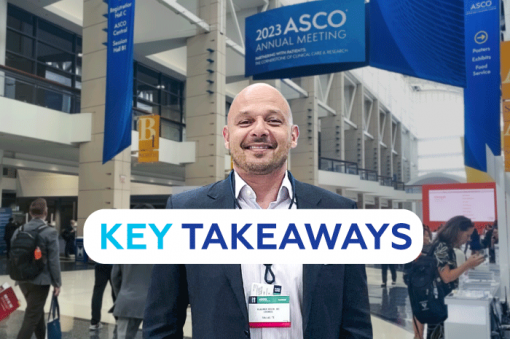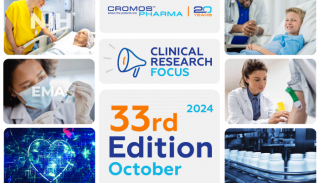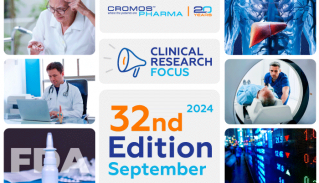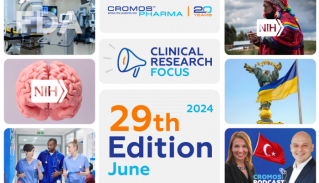
Insights from ASCO 2023
Cromos Pharma’s CEO, Vlad Bogin, recently attended the 58th meeting of the American Society of Clinical Oncology (ASCO). Vlad took part in discussions with key opinion leaders about current clinical research trends and held a significant number of meetings with biotech and pharma stakeholders to discuss their development programs.
Here are Vlad’s key takeaways from this year’s ASCO:
New Scientific Discoveries and Advancements
Among the most exciting oncology advancements of late is the potential of bispecific T-cell receptors (TCRs).
Bispecific T-cell receptors (TCRs) are indeed an exciting advancement in the field of oncology. TCRs are proteins found on the surface of T cells, which are a type of immune cell involved in recognizing and eliminating abnormal cells, including cancer cells. Bispecific TCRs are engineered molecules that can recognize both TCRs on T cells and specific cancer antigens present on tumor cells simultaneously. Several companies are researching this immunotherapy, and in January 2022, Immunocore gained the first-ever FDA approval of a TCR therapeutic with KIMMTRAK® (tebentafusp-tebn) for the treatment of unresectable or metastatic uveal melanoma.
CAR-T cell therapy (Chimeric Antigen Receptor T cell therapy) is another potential game-changer in cancer care.
CAR-T cell therapy is a groundbreaking form of immunotherapy that has shown remarkable success in the treatment of certain types of cancer. CAR-T cell therapy involves genetically modifying a patient’s own T cells to express a chimeric antigen receptor (CAR) on their surface. The CAR is designed to recognize specific cancer antigens, allowing the T cells to target and kill cancer cells more effectively.
Many pharma/biotech companies have begun discovering ways around the challenges that solid tumors present and uncovering the potential for CAR-T therapy in solid tumor types including lung, kidney, and bone cancer.
Immunotherapy treatments using anti-PD-1 (Programmed Cell Death Protein 1) antibodies have revolutionized cancer treatment.
Anti-PD-1 therapies are a type of immune checkpoint inhibition that enhances the body’s immune response against cancer cells by blocking the PD-1 receptor on immune cells. PD-1 is a receptor found on immune cells, particularly T cells. It plays a role in regulating the immune response and preventing excessive immune activity. Cancer cells often exploit the PD-1 pathway to evade immune surveillance. Anti-PD-1 antibodies, such as pembrolizumab and nivolumab, block the interaction between PD-1 and its ligands (PD-L1 and PD-L2), thereby releasing the “brakes” on the immune system and allowing T cells to recognize and attack cancer cells. Anti-PD-1 immunotherapy demonstrated remarkable efficacy and durable responses, leading to improved long-term survival in many cancers.
Personalized treatments based on tumor markers or patient’s tumor
Personalized treatments based on tumor markers or a patient’s tumor characteristics are an essential aspect of modern oncology. These approaches involve tailoring treatment plans to the individual patient’s specific tumor biology, genetic profile, and other molecular markers. Here are some key aspects of personalized treatments:
- Molecular profiling: Molecular profiling techniques, such as genomic sequencing, identify specific genetic alterations, mutations, or other molecular markers within a patient’s tumor.
- Targeted therapies: Targeted therapies are designed to selectively inhibit specific molecular targets that are crucial for tumor growth or survival.
- Biomarker-driven therapy: Biomarkers, such as the expression of specific proteins or genetic alterations, can serve as indicators of treatment response or help identify patients who are more likely to benefit from a particular therapy.
- Adaptive treatment strategies: Personalized treatments also incorporate adaptive treatment strategies, where therapy is adjusted based on the patient’s response and evolving tumor characteristics.
Using the Capabilities of Artificial Intelligence in Oncology
Artificial intelligence (AI) has shown great potential in the field of oncology, offering new ways to improve cancer detection, diagnosis, treatment planning, and patient care. Here are some areas where AI is being applied in oncology:
- Early detection and diagnosis: AI algorithms can analyze medical imaging data, such as mammograms, CT scans, and MRIs, to detect early signs of cancer.
- Optimization of drug dosing: AI can calibrate from an initial treatment drug dosing period and recalibrate over time as more data are collected.
- Precision medicine: AI can assist in identifying specific biomarkers and genetic mutations associated with cancer.
- Treatment planning and prediction: AI can aid oncologists in developing treatment plans by analyzing a patient’s medical history, genomic data, and response to previous treatments.
- Drug discovery and development: AI is being utilized in the discovery and development of new cancer drugs.
- Clinical decision support: AI-powered decision support systems can provide oncologists with evidence-based recommendations for treatment options, considering a patient’s specific characteristics and medical history.
- Patient monitoring and follow-up: AI can aid in monitoring patients during and after cancer treatment.
It’s important to note that while AI has shown promise in oncology, it is not meant to replace human expertise and judgment.
It is imperative for clinicians to see the added value AI brings in optimizing patient care. Validation, in large-scale studies, is critical in refining models and in providing confidence in the AI tools – particularly, in oncology, where the stakes in decision-making are often high.
Patient-Centric Approaches
ASCO 2023 placed a strong emphasis on patient-centric care. The integration of patient-reported outcomes and real-world evidence in clinical trials and treatment decision-making processes was highlighted. Incorporating patient preferences, values, and quality of life assessments in treatment plans ensures a holistic approach to cancer care. Moreover, innovative tools and technologies aimed at enhancing patient engagement, education, and support systems were presented, promoting better overall patient experiences throughout their cancer journey.
Notable Clinical Trials at a Glace
Results from the NATALEE trial, in which Cromos Pharma was actively involved, found that treating early-stage, hormone receptor-positive, HER2-negative breast cancer with Kisqali plus an aromatase inhibitor after surgery reduced the risk of recurrence by about 25% more than treating it with an aromatase inhibitor alone.
In a final overall survival (OS) analysis of the ADAURA study, adjuvant treatment with osimertinib provided a significant OS benefit among patients with completely resected, EGFR-mutated, stage IB to IIIA NSCLC (88% of patients with IB to IIIA NSCLC who were administered osimertinib after surgery were survived for 5 years, compared to 78% of patients treated with placebo). Overall, there was a 51% lower risk of death for those who received osimertinib compared to those who received placebo.
An oral dual inhibitor of mutant IDH1/2 enzymes, vorasidenib in INDIGO trial, significantly improved progression-free survival (PFS) in patients with grade 2 gliomas (median of 27.7 months vs 11.1 months for placebo) and a delay in the time to next treatment.
The study data from the Phase 3 PROSPECT trial indicated de-escalating by selective use of radiation therapy in neoadjuvant settings prior to surgery for certain subgroups of patients with locally advanced rectal cancer can reduce treatment associated, short- and long-term side effects that impact the quality of life while providing similar outcomes in PFS and OS.
A phase 3 KEYNOTE-826 clinical trial demonstrated that adding pembrolizumab to chemotherapy helped people with advanced cervical cancer live longer. Pembrolizumab delayed cancer growth with medium OS of 26.4 months in the pembrolizumab group vs. 16.8 months in the placebo group at a median follow-up of 39.1 months.
According to results from the phase 3 MIRASOL trial, mirvetuximab soravtansine-gynx (Elahere) achieved a 35% reduction in the risk of disease progression or death compared with investigator’s choice of chemotherapy in patients with folate receptor alpha (FRα)-high, platinum-resistant ovarian cancer, according to a press briefing presentation during the 2023 ASCO Annual Meeting. Results showed that the median progression-free survival was 5.62 months (95% CI, 4.34-5.95) with mirvetuximab soravtansine compared with 3.98 months (95% CI, 2.86-4.47) with investigator’s choice of chemotherapy (HR, 0.65; 95% CI, 0.52-0.81; P < .0001). Mirvetuximab soravtansine is the first novel treatment to demonstrate a benefit in OS in platinum-resistant ovarian cancer in a phase 3 setting.
The combination of the PD-1 inhibitor nivolumab and the LAG-3 inhibitor relatlimab received U.S. Food and Drug Administration approval for the treatment of patients with unresectable or metastatic melanoma based on RELATIVITY-047. In this trial, 714 patients with untreated unresectable or metastatic melanoma were randomly assigned to fixed-dose relatlimab and nivolumab or nivolumab alone administered every 4 weeks. After a median follow-up of 13.2 months, the trial met its primary endpoint, demonstrating an improvement in PFS by blinded independent central review (BICR; median, 10.1 vs 4.6 months; HR 0.75, 95% CI [0.62, 0.92]; P = .006). A subsequent analysis after a median follow-up of 19.3 months continued to demonstrate a PFS benefit with the combination and showed a nonsignificant trend toward improved OS.
ASCO 2023 showcased remarkable breakthroughs and significant advances in various areas of oncology. From immunotherapy to precision medicine, targeted therapies, liquid biopsies, and patient-centric care, the conference underscored the potential for transformative changes in cancer treatment and patient outcomes. Biotech professionals should stay informed and actively engage with the latest research and innovations to leverage these breakthroughs in their respective fields. By embracing these advancements, we can collectively work towards a future where cancer is better understood, more effectively treated, and ultimately, conquered.
For Сromos Pharma, an annual visit to ASCO has become a tradition. Look for us at ASCO 2024!






























